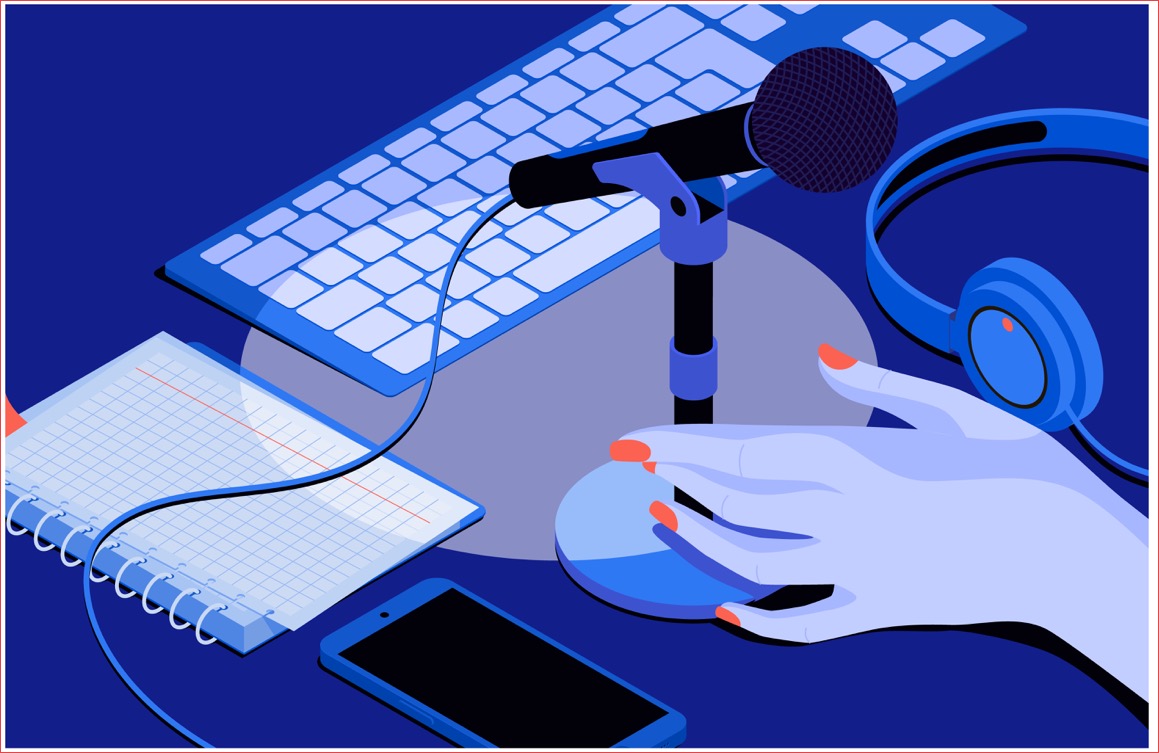Podcasting. GE is doing it. McDonald’s is doing it. Even eBay is doing it. But why? Didn’t radio die a quarter-century ago with the advent of the internet?
The reason for podcasting’s recent success is difficult to pin on one particular factor. But a big part of the explanation inevitably comes down to advertising fatigue. People are sick and tired of being continually bombarded with advertising messages that don’t offer them any real value and they’re rising up, like cranky medieval peasants.
Ad-blocking software, turning the radio off for the commercials, and muting the TV during ad-breaks are all acts of consumer rebellion. We don’t want companies taking up our time with messages that don’t give us anything in return. It feels like an imposition and interrupts our enjoyment of whatever it is that we’re trying to consume. We want to be able to sit on the bus in peace listening to our media or looking out of the window, without some random company telling us about their “new and exciting product” that we can’t live without. Well, sorry fellas, but it’s probably neither “new,” nor “exciting” and we already managed to live this long without it perfectly fine.
All these ad-evasion tactics (like ad-blocking and so on) are symptoms of a broader problem: advertisers unthinkingly demand our attention as consumers but repeatedly fail to provide value in return. Frankly, it’s outrageous. No wonder people are rising up.
Podcasting, however, represents something of a breakthrough for both advertising AND customer relations. People want companies to converse with them in respectful and meaningful ways, not just bombard them with repetitive and painfully turgid advertising messages. Podcasts entertain, educate, and thrill, and something else: they don’t insult the intelligence of the audience.

Podcasts Educate And Occasionally, Apologize
The idea of a company like McDonald’s running a podcast is, frankly, quite hilarious. Why would a purveyor of artery-clogging dross want to create a podcast to talk about the high-salt, high-fat, and high-sugar content of its food?
McDonald’s has a problem on its hands. Yes, it’s the world’s most successful fast-food chain, but it’s also a victim of its own success, becoming a poster-child for all that’s wrong with the modern, industrial food industry. If there’s something nasty lurking in the nation’s food products (like horse meat or chicken feet), then no doubt, it’ll turn up somewhere in the form of a McNugget.
Joan Cabrera, SVP of corporate relations at McDonald’s explained to Adweek how the company’s podcast helps the business. He says that it allows the fast food joint to exercise some healthy apologetics: yes, it sells junk, he admits, but at least with a podcast, it can be honest by “acknowledging and apologizing for [its] mistakes,” thus preserving the brand.
Hopefully, you don’t need to apologize for the products your company makes. But there’s a good chance that you might need to educate people about them. Podcasting lets you do that in a distinctly pleasant and respectful way. You present your case, and consumers get more than a single soundbite or annoying, professionally-crafted jingle stuck in their head.
Podcasts Provide A Platform To Empower Users
While apologetics might be necessary for some firms, the most effective advertising is that which empowers consumers to improve their circumstances. eBay knows this, which is why the auction site has started offering a bunch of educational material and podcasts to its audience to spur them on to create their own businesses and, hopefully, use its website in the process.
eBay doesn’t just reel off a bunch of instructions like some irritating advice blog. Instead, it adopts a distinctly journalistic tone, treating its podcast more like a newcast or interview than a commercial message. Topics include things like how to survive the hardships of being an entrepreneur, getting started as an e-commerce vendor, and how to re-invent your business. What’s more, it all ties in nicely with eBay’s own story as a major startup success. eBay wants to foster the next generation of million-dollar companies.

Podcasts Help To Attract New Audiences
eBay, in many ways, has a captive audience for its podcasts. Members of its platform want to know how to develop better offerings so that they can compete effectively with everybody else on the marketplace. But podcasts are also highly effective at generating what digital marketers call “impressions” – exposure to company marketing materials.
Impressions are a vital component of the marketing funnel. They’re what first generate awareness of who you are and what you do so that later on, when a customer needs your services, they think of you.
Slack, the business messaging app provider has a podcast called Slack Variety Pack. The purpose of the podcast is to open the eyes of business owners to the potential of great teams. In each episode, you can discover a glorious mix of stories about teamwork, innovation, and company culture.
Again, you can see what Slack is doing here. Just like eBay, it’s focusing on subject matter that’s related to its product, hoping that it’ll attract people who have a nascent and growing interest in creating better teams and corporate environments. Importantly, the podcast reaches out to people who might not ordinarily come into contact with the company, creating a positive impression. A particular listener might not have any need for Slack’s services right now, but if the company can give a customer something valuable, then they’re much more likely to use Slack’s products when the time is right.
Podcasts Are Inexpensive And Quick To Produce
Granted, the best podcasts are run by teams of people specializing in different areas. But practically all forms of content marketing, whether podcasts or not, rely on multiple people to some degree. Even if all your company does is churn out blogs, you need people who can write and who understand how to post them on your site.
Getting started with a podcast is technically simple: you need a microphone, headphones, computer, stand for your mic, shock mount, and perhaps some audio editing tools. That’s all. Creating the podcasts and coming up with ideas is a labor-intensive process, but with the potential to add an enormous amount of value. Both cheap and repeatable, it shouldn’t come as a surprise that so many companies are doing it.
There’s also the possibility of daisy-chaining: a customer might listen to a podcast, like what they hear and then create their own content linking to it. Ark Invest – an equity broker – is a perfect example of this in action. The firm does original, in-depth research into disruptive innovation, and then people interested in that link to the company’s podcasts and other materials, amplifying its reach.


 We are committed to serving the podcasting community by creating meaningful content, useful tools, and high-quality services that make podcasting more fun and rewarding.
We are committed to serving the podcasting community by creating meaningful content, useful tools, and high-quality services that make podcasting more fun and rewarding.